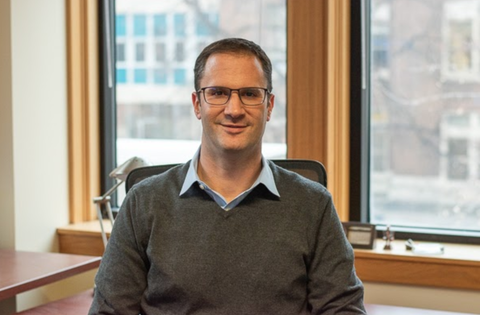Associate Professor Matthew Weber studies how legislators find and use facts in their policies on adolescent depression.
Almost thirty-two percent of high school students reported symptoms of a major depressive episode in 2017, according to a survey conducted by the Centers for Disease Control and Prevention. Also cited in that survey is the fact that of youth ages 12-17 diagnosed with a major depressive episode, almost six in 10 did not receive treatment.
Adolescent depression is a complex and emotional topic, and people have strong opinions about screening processes.
“The issue of adolescent depression should matter to any parent and any young adult these days,” said Associate Professor Matthew Weber. “It's a polarizing topic. [There are] a lot of different points of view on how we should talk about this topic, how we should mandate policy around this topic, and whether or not there should even be policy mandated around this topic.”
With his combined affinity for computation and communication, Weber is looking at how information systems can help legislators navigate the complexity and the emotions of the issue so they can make policies on adolescent depression screenings. His research focuses on the information ecosystems—the network of websites and social media—that help policy makers find important information online. “I’ve started working on that issue of bringing together the complexity of information sharing with policy-making processes,” Weber says.
His goal is to make the facts on depression screenings easier to find so that policy makers can make informed decisions. “I believe it's really important that we be able to turn to some of the research evidence that's available that [can] guide the discussion around these issues in a more neutral way.”
Simplifying Policy Making
“I'm primarily a quantitative scholar, and most of the work I do is looking at the patterns in how we communicate online, how organizations use technology, and how they establish relationships with other organizations.” Weber has studied both industrial engineering and communication and has combined the two in order to research information ecosystems. He credits his interdisciplinary background for giving him an advantage in navigating different domains and setting his research apart from others.
Weber focuses specifically on the policy making around adolescent depression screening at the state level. “Federal policy making today is just a mess, particularly… policy making around issues that pertain to young adults, youth, schools, health, and education,” he says.
Weber is focusing on the efforts of state legislators in New Jersey to address depression screening in adolescents. A current proposal mandates that schools have on-staff psychologists who can screen students. “There are a lot of questions about how you design a policy like that. And there are a lot of people who have a voice in that conversation. And what you find when you start to look at the state level is you don't really know who's involved in the conversation.”
His research aims to cut through this confusion and identify who has a voice in making those policies by using an automated system that searches through newspapers to find when depression screening is being talked about, and who is talking about it. Social media has also become a big part of his research; Weber uses hashtags to search for keywords about depression on social media platforms. “When you start to layer media coverage, policy making, and social media coverage, you start to get a sense of the overall conversation and that's going to help us hone in on who the key stakeholders are.”
The William T. Grant Foundation, a nonprofit that funds research that focuses on bettering the lives of youth, is funding Weber’s project, which is being run in partnership with colleagues at Rutgers University in New Jersey. To receive this grant, Weber’s research proposal went through a rigorous external review process. “It is reviewed by three to six academics working in public policy, healthcare, and communications.” His three-year grant began in July after his collaborative proposal was accepted.
Battling Stigma with Facts
Weber’s three-year research project has caught the attention of the National Alliance on Mental Illness. “Moving forward we will be working with the National Alliance on Mental Illness to build a number of protocols and policy briefs to hopefully create a system by which we can start to infuse a better awareness of the available research to help guide this debate.”
“There are a lot of competing ideas about how to go about addressing the issues of adolescent depression,” Weber says. His hope is that his research can make a change in how the issue of adolescent depression is framed in policy-making discussion. “I’m trying to move the needle on the type of research that's being used in this policy-making process as New Jersey moves forward.” Although Weber’s work focuses on New Jersey, it creates an opportunity to better understand adolescent depression policies on a national level.
This article was written by Lauren Borchart, a Hubbard School student and student in CLAgency.
